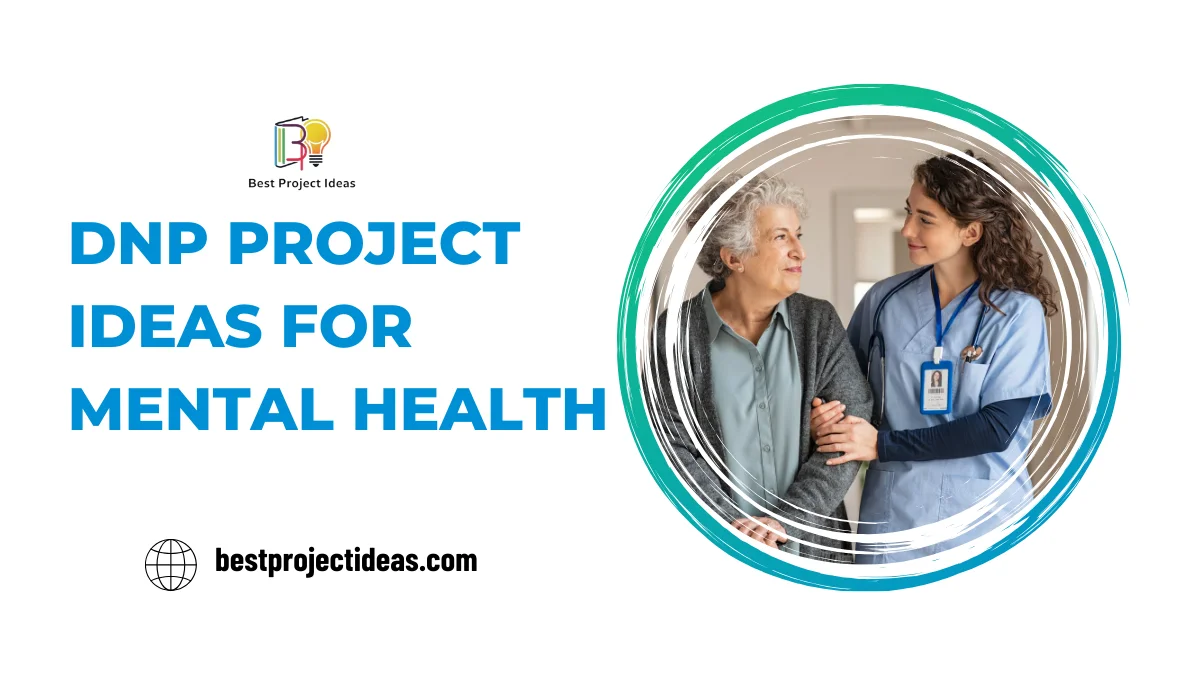
Mental health problems are becoming more common. New research shows that about 1 in 5 adults faces mental health issues every year. This blog shares ideas for DNP projects about mental health.
These projects can help improve mental health care and support. You’ll find simple and helpful ideas here if you’re a nurse or just care about mental health. Read on to learn ways you can make a real difference in mental health care.
Also Read: 211+ Latest SK Project Ideas For Students (Updated 2024)
What Does DNP Stand For?
Usually, DNP stands for Doctor of Nursing Practice, an advanced degree for nurses that is specifically clinical-focused instead of research.
The DNP focuses on preparing nurses for leadership roles in healthcare, emphasizing evidence-based practice and quality improvement.
DNP programs typically require a master’s degree in nursing as a prerequisite and last about 3-4 years.
Graduates with a DNP can work in different settings, including hospitals, clinics, and academia, often occupying advanced practice or administrative positions.
To be precise, the DNP is regarded as the highest possible level of education in a nursing specialty that equals a PhD concerning academic achievements but has other priorities.
Importance Of DNP Projects For Mental Health
DNP projects on mental health are crucial for advancing patient care and improving outcomes.
These evidence-based projects let nurse practitioners fix important problems in mental health treatment, like getting care, reducing stigma, and using new therapies.
DNP projects close the gap between theory and real-world use by doing research and using what they find in real practice.
They also help create better rules and plans in mental health care settings.
Ultimately, DNP projects in mental health improve care, promote best practices, and drive good changes in mental health nursing.
DNP Project Ideas for Mental Health
Checkout the DNP project ideas for mental health:
School Mental Health
1. Buddy system for new students
2. Calm corners in classrooms
3. Teacher training on spotting anxiety
4. Mindfulness breaks between lessons
5. Parent workshops on teen stress
6. Peer support groups for bullying
7. Art therapy for expressing feelings
8. Outdoor learning to boost mood
9. Stress-free testing methods
10. Social skills games at recess
11. Emotion check-ins each morning
12. Therapy dogs visit weekly
13. Yoga classes after school
14. Positive self-talk posters
15. Kindness challenges for students
Workplace Mental Health
16. Flexible work hours for better balance
17. Quiet rooms for decompressing
18. Mental health days added to sick leave
19. Team-building nature walks
20. Stress management lunch-and-learns
21. Anonymous support hotline
22. Ergonomic office setups
23. Peer mental health champions
24. Meditation app subscriptions
25. Conflict resolution training
26. Job sharing options
27. Workplace garden for relaxation
28. Standing desks for energy boost
29. Gratitude journal challenges
30. Fun fitness challenges
Elderly Mental Health
31. Memory cafes for socializing
32. Intergenerational storytelling programs
33. Pet therapy visits
34. Virtual reality travel experiences
35. Adaptive exercise classes
36. Reminiscence groups with old photos
37. Art classes for self-expression
38. Volunteer opportunities for purpose
39. Tech training to connect with family
40. Nature walks for sensory stimulation
41. Music therapy sessions
42. Gardening clubs for nurturing
43. Brain games to stay sharp
44. Laughter yoga classes
45. Peer counseling programs
Child Mental Health
46. Play therapy rooms in schools
47. Emotion picture books for kids
48. Worry monster craft projects
49. Calm-down jars for anger management
50. Puppet shows about feelings
51. Sensory-friendly play areas
52. Positive affirmation mirrors
53. Emotion bingo games
54. Friendship-building recess activities
55. Kids’ yoga and mindfulness classes
56. Therapeutic coloring stations
57. Feelings check-in boards
58. Kindness rocks painting projects
59. “Coping skills toolbox” workshops
60. Animal-assisted therapy visits
Veteran Mental Health
61. Peer support groups led by vets
62. Outdoor adventure therapy programs
63. Service dog training initiatives
64. Art therapy for PTSD expression
65. Virtual reality exposure therapy
66. Veteran-focused yoga classes
67. Community gardens for grounding
68. Family reintegration workshops
69. Job skills training programs
70. Equine therapy sessions
71. Mindfulness retreats for vets
72. Volunteer opportunities for purpose
73. Writing workshops for processing
74. Adaptive sports leagues
75. Couples counseling for deployment stress
Postpartum Mental Health
76. In-home counseling visits
77. New parent support groups
78. Baby-friendly yoga classes
79. Sleep coaching for parents
80. Partner in mental health education
81. Postpartum doula services
82. Meal delivery for overwhelmed moms
83. Online forums for nighttime support
84. “Mommy and Me” exercise classes
85. Breastfeeding mental health support
86. Infant massage classes for bonding
87. Time management coaching
88. Postpartum body image workshops
89. Childbirth trauma processing groups
90. Meditation apps for new parents
LGBTQ+ Mental Health
91. LGBTQ+ affirming therapist directory
92. Coming out support groups
93. Gender-affirming voice therapy
94. Queer book clubs for connection
95. LGBTQ+ inclusive sex education
96. Rainbow yoga classes
97. Drag queen story hours for kids
98. Queer art therapy workshops
99. LGBTQ+ elder befriending programs
100. Trans-inclusive fitness classes
101. Queer-friendly housing resources
102. LGBTQ+ career mentorship programs
103. Ally training for families
104. Queer grief support groups
105. LGBTQ+ substance abuse recovery
Rural Mental Health
106. Teletherapy access points
107. Mobile mental health clinics
108. Faith leader mental health training
109. Farm stress hotlines
110. Mental health first aid for ranchers
111. School-based telepsychiatry
112. Community movie nights for connection
113. 4-H mental health awareness projects
114. Rural LGBTQ+ support networks
115. Farmer’s market mindfulness booths
116. Barn quilt therapy groups
117. Fishing therapy programs
118. Substance abuse support in churches
119. “Dinner table talk” mental health kits
120. County fair mental health screenings
College Student Mental Health
121. Therapy dog visits during finals
122. Stress-relief vending machines
123. Peer counseling training programs
124. Nap pods in libraries
125. Mental health apps for students
126. “Failure resume” workshops
127. Mindfulness corners in dorms
128. Time management coaching
129. Substance-free social events
130. LGBTQ+ support groups
131. First-generation student mentoring
132. Grief and loss support circles
133. Cultural adjustment groups
134. Social media detox challenges
135. Test anxiety coping workshops
Caregiver Mental Health
136. Respite care matching services
137. Virtual support groups
138. Mindfulness apps for caregivers
139. Home care skills training
140. Caregiver yoga and stretching classes
141. Meal prep services for burnout
142. Art therapy for stress relief
143. Caregiver pen pal programs
144. “Me time” scheduling workshops
145. Grief and anticipatory loss groups
146. Financial planning for caregivers
147. Adaptive equipment lending libraries
148. Caregiver spa days
149. Family conflict mediation services
150. Compassion fatigue prevention training
Athlete Mental Health
151. Sports psychology workshops
152. Injury recovery support groups
153. Performance anxiety coping skills
154. Meditation for focus training
155. Body image support for athletes
156. Retirement transition counseling
157. Team-building nature retreats
158. Mindful eating for athletes
159. Social media pressure workshops
160. LGBTQ+ athlete support networks
161. Concussion recovery mental health
162. Sport-specific yoga classes
163. Mental toughness training programs
164. Athletes for mental health campaigns
165. Substance abuse prevention for teams
First Responder Mental Health
166. Peer support training programs
167. Critical incident stress debriefings
168. Mindfulness for high-stress jobs
169. Family support groups
170. Therapy dog programs for stations
171. Sleep hygiene for shift workers
172. Trauma-informed yoga classes
173. Art therapy for processing calls
174. Couples retreats for connection
175. Substance abuse prevention training
176. Retirement transition support
177. Stress resilience boot camps
178. Humor as a coping skill workshops
179. Chaplaincy programs for spiritual care
180. Financial wellness for stress reduction
Chronic Illness Mental Health
181. Online support communities
182. Pain management meditation apps
183. Adaptive yoga classes
184. Chronic illness life coaching
185. Expressive writing workshops
186. “Spoonie” meetup groups
187. Body acceptance art therapy
188. Caregiver mental health check-ins
189. Fatigue management strategies
190. Coping with uncertainty groups
191. Intimacy and illness workshops
192. Career transition support
193. Mindful eating for symptom management
194. Peer mentoring programs
195. Assistive tech for independence
Addiction Recovery Mental Health
196. Sober living community gardens
197. Expressive arts therapy groups
198. Mindfulness-based relapse prevention
199. Recovery yoga and meditation classes
200. Sober social event planning
201. Family healing workshops
202. Job skills training programs
203. Recovery coaching certifications
204. LGBTQ+-specific recovery groups
205. Trauma-informed addiction therapy
206. Adventure therapy for recovery
207. Financial wellness in recovery
208. Nutrition for Healing workshops
209. Peer-led recovery support groups
210. Medication-assisted treatment education
Grief and Loss of Mental Health
211. Pet loss support groups
212. Memory book creation workshops
213. Grief yoga and movement classes
214. Nature-based healing retreats
215. Online memorials and support forums
216. Expressive writing for mourning
217. Art therapy for processing loss
218. Peer-led bereavement groups
219. Grief in the workplace education
220. Cultural-specific mourning practices
221. Single-parent grief support
222. Grieving with chronic illness groups
223. Digital legacy planning workshops
224. Mindfulness for grief and loss
225. Remembrance gardening projects
How To Decide On A DNP Project?
No doubt, picking a DNP project can feel tough. But don’t worry! Here are some easy tips to help you choose:
- Think about what you love. Pick a topic that gets you excited.
- Look at problems in your workplace. Your project could fix a real issue.
- Talk to your teachers and classmates. They might have good ideas.
- Read about new things in nursing. You could study something fresh and helpful.
- Consider what you’re good at. Use your strengths in your project.
- Think about who you want to help. Your work could make a big difference.
Remember, the best project matters to you and can help others.
How To Find A DNP Project For Students?
To find a DNP (Doctor of Nursing Practice) project for students, consider these steps:
- Identify clinical issues: Look for problems or areas for improvement in your current healthcare setting.
- Consult faculty advisors: They can guide suitable project topics and scope.
- Review literature: Explore current research to find gaps or areas needing further study.
- Collaborate with healthcare facilities: Partner with local hospitals or clinics to address their needs.
- Consider population health: Focus on community health issues or underserved populations.
- Align with your interests: Choose a topic that matches your professional goals and passions.
- Assess feasibility: Ensure the project can be completed within your program’s timeframe and resources.
- Explore quality improvement: Explore ways to enhance patient care processes or outcomes.
- Investigate technology integration: Consider projects involving health IT or telemedicine.
- Network with DNP alumni: They may offer insights from their project experiences.
Why Are DNP Projects Important?
DNP projects are important for several key reasons:
- Evidence-based practice: They promote using research findings to make patient care better.
- Healthcare innovation: Projects often lead to new ways or solutions in clinical practice.
- Leadership development: Students learn to lead and manage complex healthcare tasks.
- Quality improvement: Many projects focus on making patient care safer and better.
- Policy impact: Some projects can change healthcare rules at hospitals or higher levels.
- Advanced clinical expertise: Projects help students learn more about specific nursing areas.
- System-level thinking: They help nurses think about bigger healthcare system issues and solutions.
- Interdisciplinary collaboration: Projects often involve working with different healthcare professionals.
- Scholarly contribution: DNP projects add to nursing knowledge and can lead to publications.
- Career advancement: Completed projects show advanced skills for career growth.
Sources To Find The Latest DNP Project Ideas for Mental Health
Here are some good places to find new DNP Project Ideas for Mental Health:
- Read nursing journals about mental health and nursing.
- Look at websites of nursing schools with good DNP programs.
- Check the websites of groups like the American Psychiatric Nurses Association or the American Association of Nurse Practitioners.
- Search for new studies in research databases like PubMed or Google Scholar.
- Go to events about mental health and nursing to hear about new ideas.
- Join online groups for DNP students to share ideas.
- Visit websites of health groups like NIH or CDC to see what’s new in mental health.
Final Words
As we wrap up our look at DNP Project Ideas for Mental Health, remember that these projects can help people. When you focus on mental health, you can make life better for many.
Your work matters and can change how we take care of mental health. Think about these ideas when you plan your project. Every bit you do helps make things better for people who need support. Thanks for reading and for wanting to make mental health care better.

